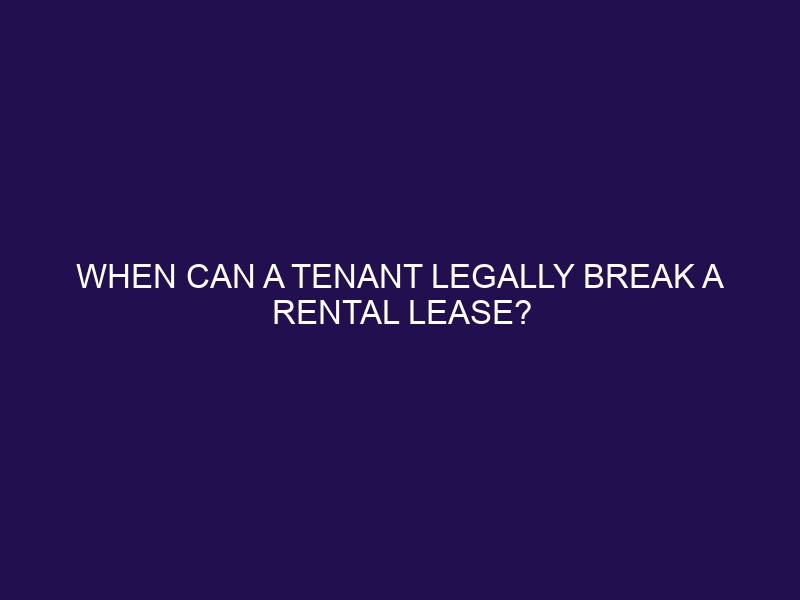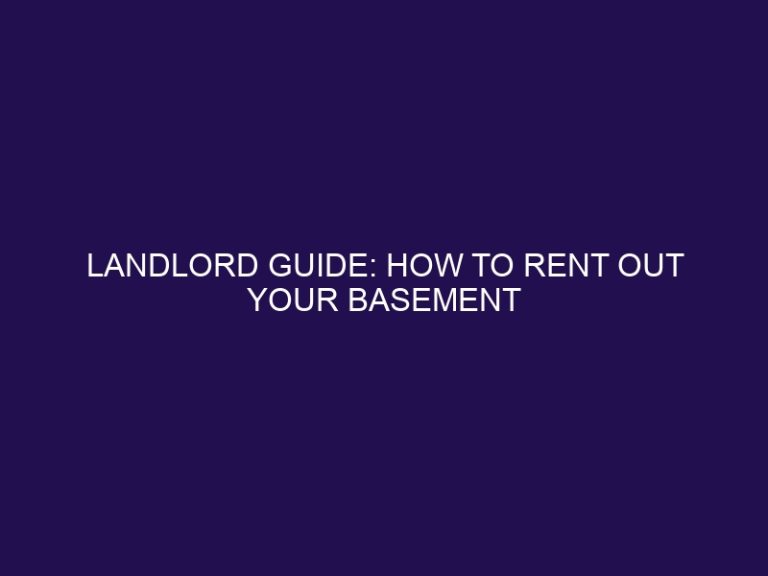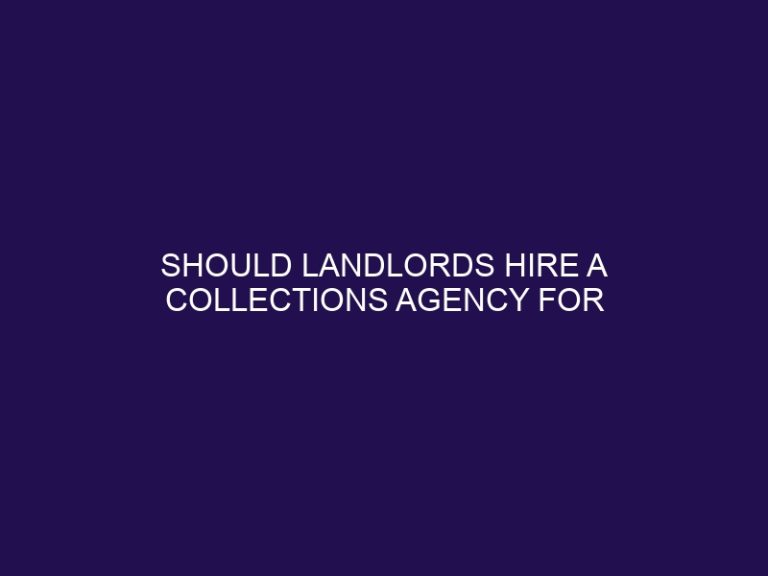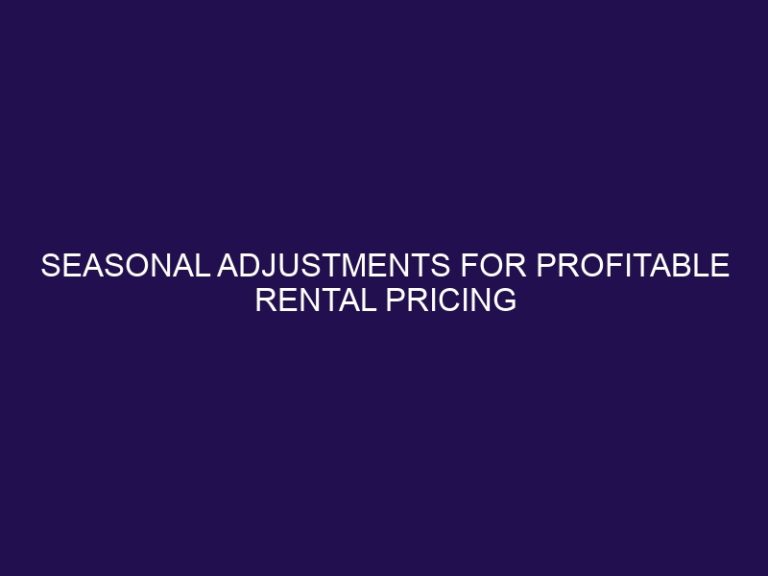When Can a Tenant Legally Break a Rental Lease?
A rental lease is a legally binding contract between a landlord and a tenant outlining the terms of a rental agreement. It specifies the rights and responsibilities of both parties during the tenancy period. Tenants are expected to fulfill the terms of the lease, which usually includes paying rent on time and taking care of the property. However, there are certain valid reasons for a tenant to break a rental lease.
One possible reason for breaking a rental lease is job relocation. If a tenant is required to move for work purposes, they may be able to legally break their lease. Another reason is military deployment, in which case the tenant is protected by the Servicemembers Civil Relief Act (SCRA). Health or safety concerns, such as mold or pest infestations, can also be valid reasons for breaking a lease. Lastly, if the landlord breaches the contract, the tenant may have grounds to terminate the lease.
To legally break a rental lease, the tenant must first review the terms of the lease and look for any clauses that allow for early termination. If there are no such clauses, the tenant must give written notice to the landlord and try to find a replacement tenant. They can also try to negotiate with the landlord for an amicable solution. However, breaking a rental lease may have consequences such as forfeiture of the security deposit, payment of remaining rent, and possible legal action by the landlord.
In conclusion, a rental lease is a legally binding contract that outlines the terms of a rental agreement between a landlord and a tenant. While tenants are expected to fulfill the terms of the lease, there are certain valid reasons for breaking it. Tenants must follow the appropriate steps and understand the possible consequences before breaking a rental lease.
Key Takeaways:
What Is a Rental Lease?
A rental lease is a legally binding agreement between a landlord and a tenant, outlining the terms and conditions of renting a property. It specifies details such as the duration of the tenancy, rental amount, and any restrictions or rules. The concept of a rental lease can be traced back to 2030 BC in Mesopotamia, making it one of the oldest known recorded leases in history.
What Are the Terms of a Rental Lease?
Before signing a rental lease, it is important for both the tenant and landlord to fully understand the terms and conditions outlined in the agreement. These terms dictate the rights and responsibilities of both parties for the duration of the lease. In this section, we will discuss the key aspects of a rental lease, including the duration of the lease, the rent amount and due date, the security deposit, and the responsibilities for utilities and maintenance. By understanding these terms, tenants can make informed decisions about breaking a rental lease in the future.
1. Duration of Lease
- Consult the lease agreement for the specific duration of the lease.
- Understand the duration of the lease, whether it is a fixed-term or a month-to-month arrangement.
- Take note of any provisions for lease renewal or termination.
2. Rent Amount and Due Date
- Come to an agreement with the landlord on the rent amount and due date.
- Ensure that the terms are clearly stated in the lease agreement.
- Establish expectations for how often rent payments will be made.
- Discuss potential penalties for late rent payments.
After careful negotiation, the tenant and landlord have agreed on a monthly rent of $1500 due on the 1st of each month, which has been documented in the lease for clarity.
3. Security Deposit
- When signing the lease, be sure to pay the full security deposit.
- To ensure a fair refund at the end of the lease, document the condition of the unit.
- Follow the terms of the lease to avoid any deductions from the security deposit.
Did you know? In most states, landlords are required to return the security deposit within a specific timeframe.
4. Utilities and Maintenance
- Utilities: Clearly define responsibilities for electricity, water, and gas payments in the lease agreement.
- Maintenance: Outline guidelines for tenant and landlord responsibilities regarding repairs and upkeep of the property.
Regular maintenance and clearly defined utility arrangements promote a harmonious landlord-tenant relationship.
What Are the Possible Reasons for Breaking a Rental Lease?
While a rental lease is a binding agreement between a landlord and a tenant, there are certain situations where a tenant may need to break the lease before its expiration. In this section, we will discuss the various reasons that may legally allow a tenant to break their rental lease. These include job relocation, military deployment, health or safety concerns, and landlord breach of contract. Understanding these potential reasons can help tenants make informed decisions and exercise their rights as renters.
1. Job Relocation
- Notify the landlord of the job relocation immediately.
- Review the lease to understand the notice period required.
- Discuss potential options with the landlord, such as subletting or lease termination.
- Follow the legal process for lease termination if needed.
A friend had to end their lease due to a job relocation. They promptly informed the landlord, found a replacement tenant, and negotiated an early lease termination without any legal issues.
2. Military Deployment
- Check the lease for military deployment clauses.
- Notify the landlord in writing of the military deployment orders.
- Provide a timeline and seek an amicable solution.
When facing military deployment, it is important to understand the terms of the lease and maintain open communication with the landlord in order to navigate the situation effectively.
3. Health or Safety Concerns
- Document: Keep records of any health or safety violations.
- Notification: Inform the landlord in writing about any concerns regarding health or safety.
- Authorities: If necessary, involve local health or building inspectors to address the concerns.
For complex situations, it may be beneficial to seek legal advice.
4. Landlord Breach of Contract
- Review the lease terms for violations related to property maintenance or failure to address safety concerns.
- Document the breaches with evidence such as photographs or correspondence.
- Notify the landlord in writing, requesting resolution within a specified timeframe.
- Consult legal counsel if necessary to address the landlord’s breach of contract.
A tenant discovered mold issues due to landlord negligence, leading to legal action and compensation.
What Are the Steps to Legally Break a Rental Lease?
Breaking a rental lease can be a difficult and complicated process, but there are steps that can be taken to do so legally. Before taking any action, it is important for tenants to review the terms of their lease to understand what options they have. Then, they must give notice to their landlord and potentially find a replacement tenant. Finally, negotiating with the landlord may be necessary to reach a mutually beneficial solution. Let’s take a closer look at each of these steps in detail.
1. Review the Terms of the Lease
- Understand the duration of the lease and any options for renewal.
- Take note of the rent amount, due date, and accepted payment methods.
- Review the details of the security deposit, including the amount and conditions for its return.
- Clarify the landlord’s responsibilities for utilities and maintenance.
2. Give Notice to the Landlord
- Notify the landlord in writing of the intention to terminate the lease.
- Clearly state the intended date of lease termination in the notice.
- Ensure that the notice is provided within the specified time frame as outlined in the lease agreement.
A tenant successfully gave notice to the landlord, following the terms of the lease, and smoothly ended the tenancy.
3. Find a Replacement Tenant
- Inform Landlord: Notify the landlord of your intention to find a replacement tenant.
- Advertise: Use various platforms to advertise the rental to attract potential tenants for the purpose of finding a replacement tenant.
- Screen Applicants: Evaluate potential tenants to ensure they meet the landlord’s requirements for a replacement tenant.
- Finalize: Coordinate with the landlord to finalize the replacement tenancy agreement.
Consider offering the landlord assistance in finding a suitable replacement tenant to facilitate a smooth transition.
4. Negotiate with the Landlord
- Understand Lease Terms: Familiarize yourself with the lease clauses before beginning negotiations with the landlord.
- Communicate Needs: Clearly express your reasons for requesting a lease modification.
- Offer Solutions: Propose compromises that will benefit both parties involved.
- Seek Professional Advice: If necessary, consult with legal experts for guidance and assistance.
What Are the Consequences of Breaking a Rental Lease?
Breaking a rental lease is a serious decision that can have consequences for both the tenant and the landlord. In this section, we will discuss the potential consequences that a tenant may face if they choose to break their rental lease. These include the forfeiture of their security deposit, the payment of remaining rent, and the possibility of legal action by the landlord. It is important for tenants to be aware of these consequences before making the decision to break their lease.
1. Forfeiture of Security Deposit
- Ensure the rental property is returned in good condition and avoid forfeiture of the security deposit.
- Abide by the notice period required for lease termination.
- Resolve outstanding rent and utility payments to avoid any deductions from the security deposit.
Sarah learned the importance of documenting the rental’s condition before moving in to avoid losing her security deposit due to property damage.
2. Payment of Remaining Rent
- Review lease terms to understand remaining rent obligations.
- Calculate the payment of remaining rent.
- Notify the landlord about early lease termination and discuss payment options.
- Document all communications and agreements regarding remaining rent.
Pro-tip: Negotiate a payment plan to avoid financial strain and maintain a positive relationship with the landlord.
3. Legal Action by Landlord
- Issue of Notice: The landlord must issue a notice to the tenant, specifying the lease violation.
- Court Proceedings: If the tenant fails to comply, the landlord can file a lawsuit for eviction and unpaid rent.
- Possible Damages: The landlord may take legal action against the tenant for financial losses caused by the lease breach.
Frequently Asked Questions
When can a tenant legally break a rental lease?
Tenants in Alabama can legally break a rental lease if they have a valid reason, such as entering active military service, experiencing domestic violence or being constructively evicted. However, they must provide appropriate notice and follow specific procedures outlined in the lease document and landlord-tenant laws to avoid legal squabbles and financial penalties.
What are considered valid reasons for breaking a lease in Alabama?
Valid reasons for breaking a lease in Alabama include entering active military service, experiencing domestic violence or being constructively evicted. Non-legal reasons, such as losing a job or wanting to move out early, may not be accepted as valid reasons and could result in financial penalties.
What are the consequences of breaking a lease in Alabama?
Breaking a lease in Alabama could result in financial penalties, such as owing the full amount of rent for the remaining lease term or future advertisement expenses for the landlord to find a new tenant. It could also have negative impacts on the tenant’s credit report and rental history. It is important for tenants to carefully review the lease agreement and understand their rights and obligations before signing to avoid such consequences.
What is the process for breaking a lease in Alabama?
The process for breaking a lease in Alabama involves giving appropriate notice to the landlord and following specific procedures outlined in the lease document and landlord-tenant laws. This may include finding a new tenant, negotiating with the landlord, or providing evidence of a valid reason for breaking the lease. It is important for tenants to actively seek legal advice and stay up to date on the current Alabama landlord-tenant laws to ensure a smooth and legally protected early termination process.
Can a tenant break a lease in Alabama for safety reasons?
Yes, a tenant can break a lease in Alabama for safety reasons if they are being unlawfully harassed, facing an unsafe environment, or experiencing domestic violence. In such cases, the tenant may be considered constructively evicted and may be able to legally end the tenancy without further rent obligation. It is important to gather evidence and provide appropriate notice to the landlord before taking any action.
Is there an opt-out clause for breaking a lease in Alabama?
No, Alabama does not have a specific opt-out clause for breaking a lease for non-legal reasons. However, tenants may negotiate with their landlord to include an early termination clause in the lease agreement or find a replacement tenant to take over the lease. It is important to carefully review the lease agreement and communicate effectively with the landlord in order to avoid any future legal problems.







